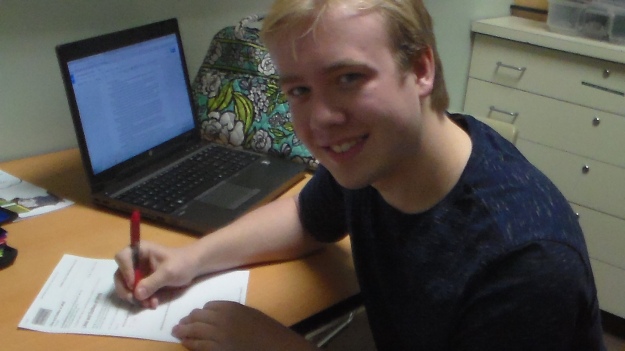By Abigail Clifford 2017
Bees play a major role in the Earth’s natural environment, from pollinating flowers to providing vital food sources. When disease takes over a bee colony, not only does the loss of bees affect the plant life surrounding them, but it also has major consequences for humans. Mr. Jim Coffey, science teacher at the Upper Perkiomen High School, has been faced with a similar problem with his in-class beehive.
Mr. Coffey’s classroom contains a wooden encased beehive that has tubes that are securely connected to outside of the nearest window, so bees can peacefully flow in and out of their hive. In the fall of 2015, Mr. Coffey’s bee population started to slowly decline. Suddenly, by the end of March, the whole bee population was gone.
“What exactly caused this is mysterious; there was plenty of food left, including 30 pounds of wax and honey,” stated Mr. Coffey.
Mr. Coffey has a strong idea that the bee colony did not survive due to a phenomenon known as Colony Collapse Disorder. This occurs when a majority of worker bees disappear, leaving the queen, plenty of food, and a few “nurses” to take care of the immature bees.
Since Mr. Coffey’s bee colony does not fit all the criteria for Colony Collapse Disorder, he believes it could also been a combination of several common diseases, ones that humans could be unintentionally inflicting upon bees.
“Pesticides seem to weaken the immune system of the bees and then they have problems fighting off diseases and pests that they normally easily defeat,” expressed Mr. Coffey.
Pesticides kill bees almost automatically when a bee tries to pollinate a flower that has recently been sprayed, thus leading to less pollinated flowers and crops. Some bees have a limited amount of time to live after being infected. Such pesticides can attack a bee’s nervous system or weaken their immune system. In Pennsylvania alone, almost sixty percent of bee colonies collapse,affecting both the crops and biodiversity.
“Herbicides are leading to a loss of biodiversity that leads to a less diverse and less nutritious food supply,” Mr. Coffey stated.
Protecting bees is beneficial to humans due to their importance to crops and biodiversity. Bees provide almost $317 million of honey a year, and one out of every three foods an American eats is pollinated by a bee. By keeping flowers pollinated, this attracts other species such as birds to an ecosystem, keeping the area alive.
There are ways to reduce the amount of pesticide used to help keep bee population up. Pesticide application should be done in the evening, so there is less residue into the morning, lessening the impact upon pollinating bees. Be aware of any beehives around a crop field before spraying pesticides and try to use a liquid form.
Mr. Coffey is planning on receiving new Italian bees from Georgia in late April.

